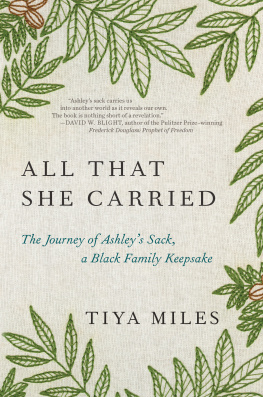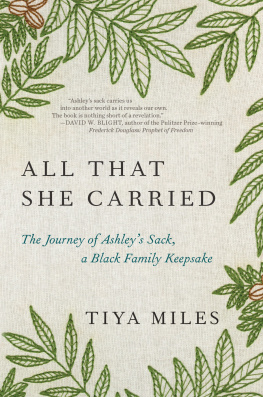Tiya Miles - The Journey of Ashleys Sack, a Black Family Keepsake
Here you can read online Tiya Miles - The Journey of Ashleys Sack, a Black Family Keepsake full text of the book (entire story) in english for free. Download pdf and epub, get meaning, cover and reviews about this ebook. year: 2021, publisher: Random House Publishing Group, genre: Home and family. Description of the work, (preface) as well as reviews are available. Best literature library LitArk.com created for fans of good reading and offers a wide selection of genres:
Romance novel
Science fiction
Adventure
Detective
Science
History
Home and family
Prose
Art
Politics
Computer
Non-fiction
Religion
Business
Children
Humor
Choose a favorite category and find really read worthwhile books. Enjoy immersion in the world of imagination, feel the emotions of the characters or learn something new for yourself, make an fascinating discovery.
- Book:The Journey of Ashleys Sack, a Black Family Keepsake
- Author:
- Publisher:Random House Publishing Group
- Genre:
- Year:2021
- Rating:4 / 5
- Favourites:Add to favourites
- Your mark:
- 80
- 1
- 2
- 3
- 4
- 5
The Journey of Ashleys Sack, a Black Family Keepsake: summary, description and annotation
We offer to read an annotation, description, summary or preface (depends on what the author of the book "The Journey of Ashleys Sack, a Black Family Keepsake" wrote himself). If you haven't found the necessary information about the book — write in the comments, we will try to find it.
Tiya Miles: author's other books
Who wrote The Journey of Ashleys Sack, a Black Family Keepsake? Find out the surname, the name of the author of the book and a list of all author's works by series.
The Journey of Ashleys Sack, a Black Family Keepsake — read online for free the complete book (whole text) full work
Below is the text of the book, divided by pages. System saving the place of the last page read, allows you to conveniently read the book "The Journey of Ashleys Sack, a Black Family Keepsake" online for free, without having to search again every time where you left off. Put a bookmark, and you can go to the page where you finished reading at any time.
Font size:
Interval:
Bookmark:
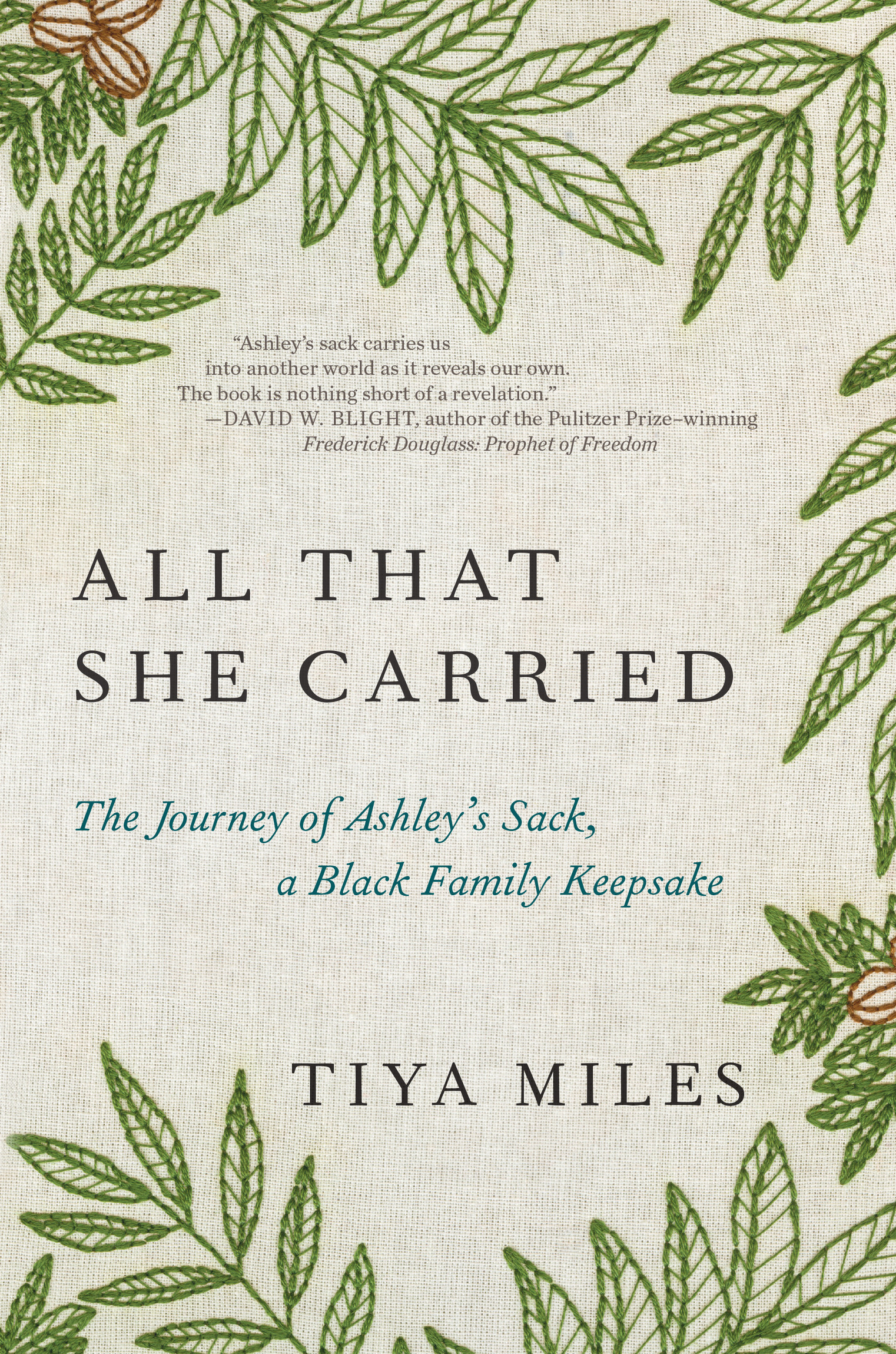
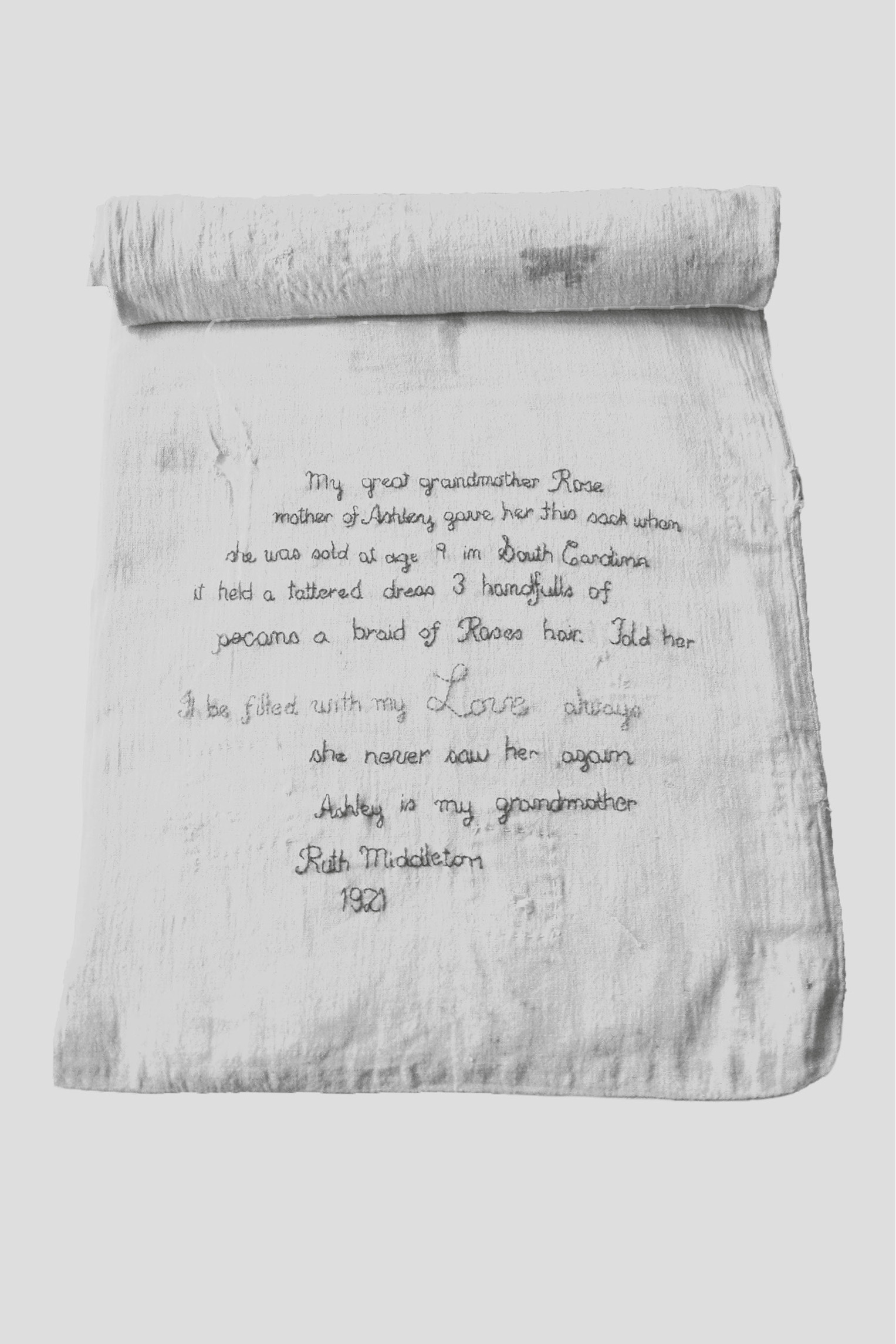
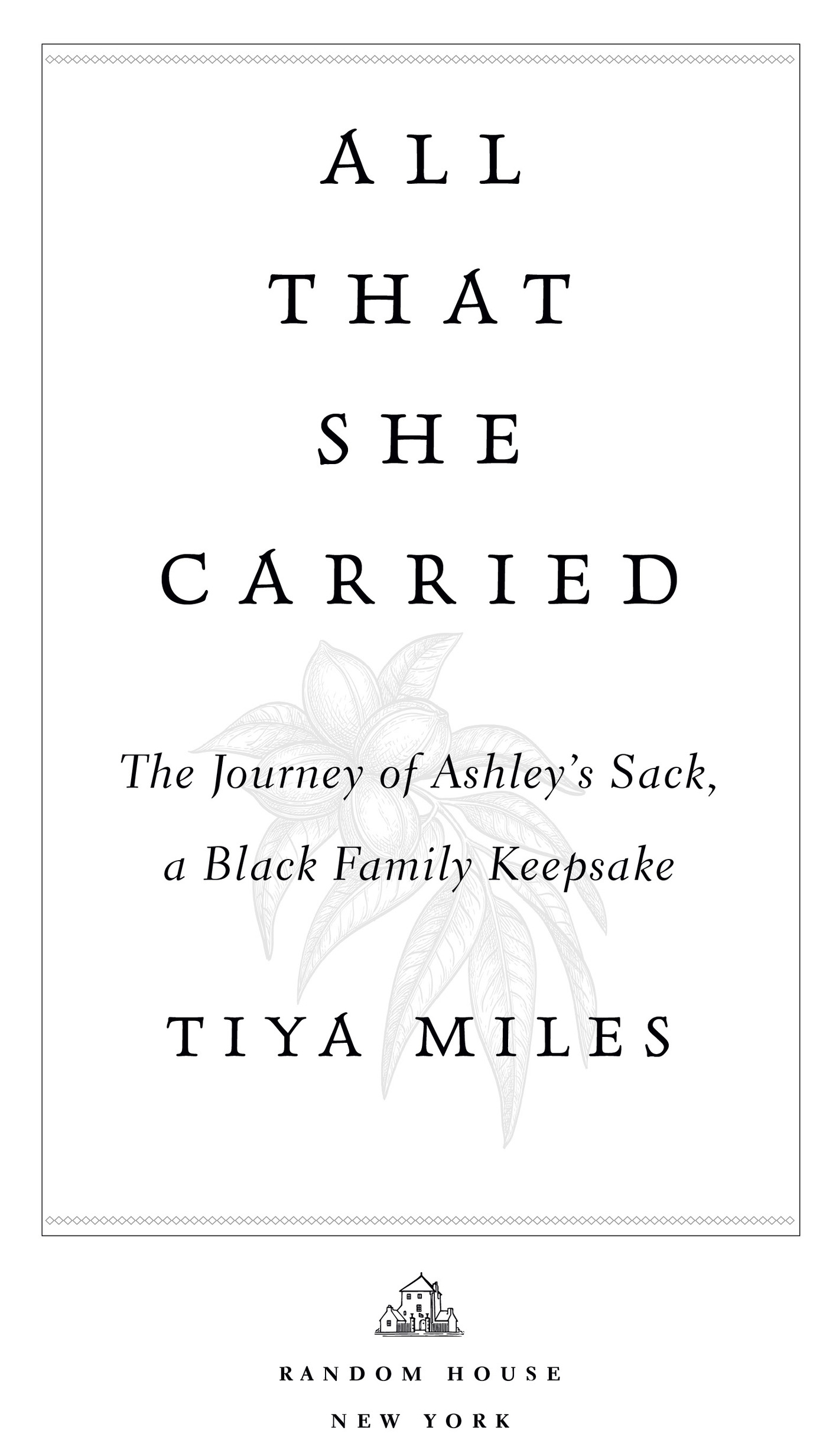
Copyright 2021 by Tiya Miles
All rights reserved.
Published in the United States by Random House, an imprint and division of Penguin Random House LLC, New York.
Random House and the House colophon are registered trademarks of Penguin Random House LLC.
Permissions Acknowledgments can be found on .
Library of Congress Cataloging-in-Publication Data
Names: Miles, Tiya, 1970- author.
Title: All that she carried: the journey of Ashleys sack, a black family keepsake / Tiya Miles.
Other titles: Journey of Ashleys sack, a black family keepsake
Description: New York: Random House, 2021. | Includes index.
Identifiers: LCCN 2020051688 (print) | LCCN 2020051689 (ebook) | ISBN 9781984854995 (hardcover) | ISBN 9781984855008 (ebook)
Subjects: LCSH: Women slavesSouth CarolinaBiography. | Ashley (Enslaved person in South Carolina) | Mothers and daughters. | Women slavesSouthern StatesSocial conditions19th century. | SlavesSouthern StatesFamily relationshipsHistory19th century. | Middleton, Ruth Jones, 19031942Family. | African American womenBiography. | African American womenFamily relationships. | MemoryUnited States.
Classification: LCC E445.S7 M55 2021 (print) | LCC E445.S7 (ebook) | DDC 306.3/620820975dc23
LC record available at https://lccn.loc.gov/2020051688
LC ebook record available at https://lccn.loc.gov/2020051689
Ebook ISBN9781984855008
randomhousebooks.com
Book design by Jo Anne Metsch, adapted for ebook
Cover design: Belina Huey
Cover art: Lauren Singleton
ep_prh_5.7.0_c0_r0
Love and empathy, together, lead to justice.
Jonathan L. Walton , A Lens of Love, 2018
Fear, too, is crucial to love.
Diane Ackerman , A Natural History of Love, 1994
I think we should make emergency packsgrab and run packsin case we need to get out of here in a hurry.
Octavia Butler , Parable of the Sower, 1993

Rose was in existential distress that fateful winter when her would-be earthly master, Robert Martin, passed away. The place: coastal South Carolina; the year: 1852. We do not know Roses family name, or the place of her birth, or the year of her death. Such is the case with the vast majority of African and Indigenous American women who were bought, sold, and exploited by the hundreds of thousands. But we can be sure that Rose faced the deep kind of trouble that no one in our present time knows and only an enslaved woman has seen. Rose knew that she or her little girl, Ashley, could be next on the auction block, the cold device enslavers turned to when their finances faltered.
Ripping families apart was a common practice in a society structured byand, indeed, dependent onthe legalized captivity of people deemed inferior. And sale could not have been the end of Roses worries or the worst of her fears. She must have dreaded what could occur during this relocation and after: the physical cruelty, sexual assault, malnourishment, mental splintering, and even death that was the lot of so many young women deemed slaves. Rose and Ashleys life together, already encased by swales of suffering, could be torn asunder in a matter of moments with the stroke of a pen. Their lives apart portended even worse without the bonds of family. Rose adored this daughter and desperately sought to keep her safe. But what could safety possibly mean in a place, at a time, when a girl not yet ten years old could be lawfully caged and bartered? What would Rose do to protect her child? What could she do as an unfree woman with no social standing, political power, economic means, or cultural currency positioned in the trenches of unpredictable and insurmountable difficulty?
The kind of fix Rose was inlife-threatening and soul-stealingwas one that Black women like her had continually encountered over more than two centuries of life in America. It was a fix articulated by the few enslaved women who managed to escape and tell their stories in the nineteenth century and, later, by Black women thinkers and artists who drew sustenance from the writings of these cultural ancestors in the generations that followed, including our own. How does a person treated like chattel express and enact a human ethic? What does an individual who is deeply devalued insist upon as her set of values? How does a woman demeaned and cowed face the abyss and still give love? Roses actions, outlined in a single and unusual text and barely preserved for history, give us a sense. When the auction block loomed on her little familys horizon, Rose gathered all of her resourcesmaterial, emotional, and spiritualand packed an emergency kit for the future. She gave that bag to her daughter, Ashley, who carried it and passed it down across the generations.
Rose possessed inner strength and creativity even as calamity struck. Saving anothers life meant acting despite despair, and she dreamed up means of survival as well as spiritual sustenance. Surely Rose felt that what she did was far too little, much too late. Surely she feared that a battered bag would not matter enough in the end. But Rose pressed on, matching the mettle of an entrenched slave society with a glimmering will of her own. And although we cannot know exactly how events unfolded, we can conclude that Roses gift did affect her descendants lives, no matter how inconsequential her act of packing may have felt in the moment. For, three generations later, a great-granddaughter of hers, Ruth Middleton, created a remarkable written record attesting to Roses deed. Ruths chronicle is evidence of a long-term effect that Rose herself would never see: her female line would continue against all odds, and her will to love would be carried forward.
Rose couldnt know how things would turn out, but she held fast to a vision. She saw her daughter alive and provided for her into the future, a radical imagining for a Black mother in the 1850s. Roses daughter, Ashley, realized that vision by surviving, and her great-granddaughter, Ruth, preserved their history by stitching sentences onto the surface of the sack. In the third decade of the twenty-first century, we face our own societal demons, equal in some respects to the system of slavery that would finally be slayed. The world feels dark to us, just as it must have for Rose, and like Rose, we cant know what will happen. We think it a fantasy that we might rescue our childrens futures, or revive our democratic principles, or redeem our damaged earth. In our moment of bleak extremity, Black women of the past can be our teachers. Who better to show us how to act when hope for the future is under threat than a mother like Roseor an entire caste of enslaved, brave women who were nothing and had nothing by the dominant standards of their time yet managed to save whom and what they loved? Rose and her long line of descendants realized that salvation depended on bearing up to the weight and promise of their baggage. We should, too.
Font size:
Interval:
Bookmark:
Similar books «The Journey of Ashleys Sack, a Black Family Keepsake»
Look at similar books to The Journey of Ashleys Sack, a Black Family Keepsake. We have selected literature similar in name and meaning in the hope of providing readers with more options to find new, interesting, not yet read works.
Discussion, reviews of the book The Journey of Ashleys Sack, a Black Family Keepsake and just readers' own opinions. Leave your comments, write what you think about the work, its meaning or the main characters. Specify what exactly you liked and what you didn't like, and why you think so.

